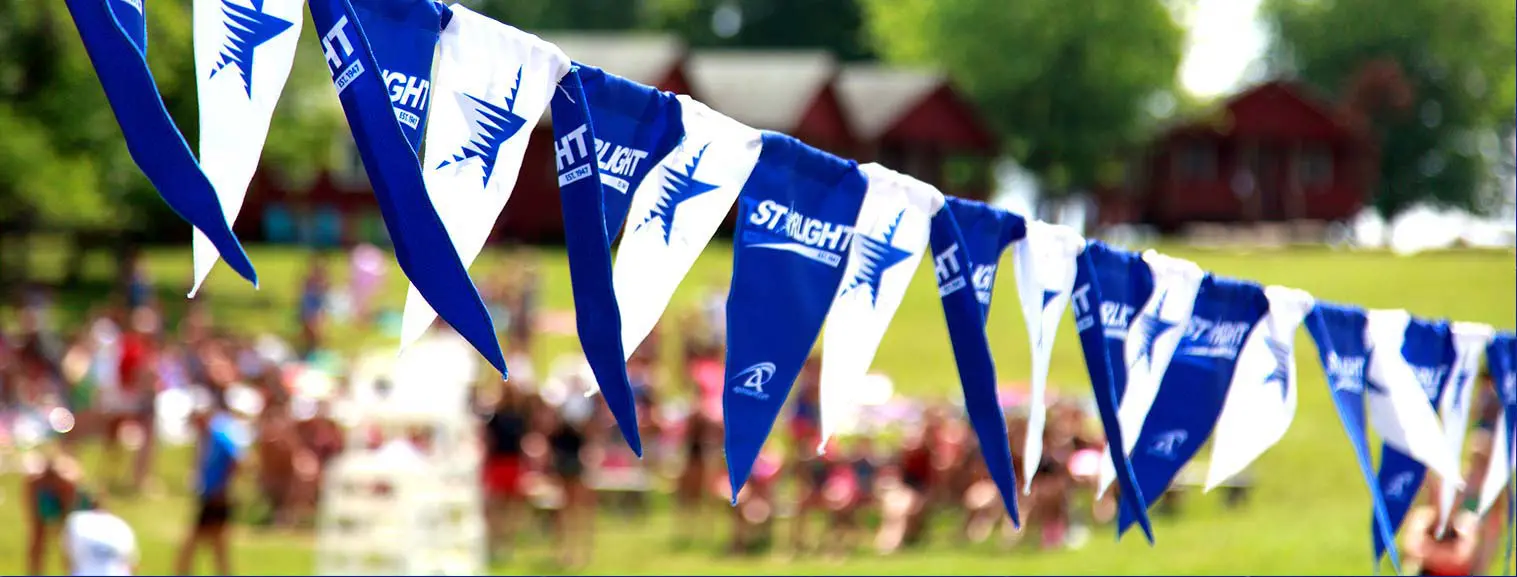Posts Tagged ‘summer camp 2011’
Tuesday, April 5th, 2011
We came across this blog and got a really good chuckle out of it. Since we’ve rounded that corner into April and the “waiting to pack” countdown has officially begun, we can’t resist sharing it with you. We would like to thank Lisa, the original author, for her permission to reprint it…
I am fortunate enough to be able to send my two older children to sleepaway camp. It is a fantastic learning, growing and 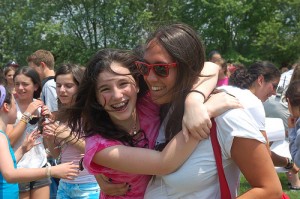 maturing experience – for me and them! My kids learn that the world still turns if they wear clothes that don’t match or the same shirt 4 days in a row, or what it’s like to meet new people, watch themselves become independent beings and experience things they never could at home (we don’t have a lake in our backyard or a kiln in the kitchen).
maturing experience – for me and them! My kids learn that the world still turns if they wear clothes that don’t match or the same shirt 4 days in a row, or what it’s like to meet new people, watch themselves become independent beings and experience things they never could at home (we don’t have a lake in our backyard or a kiln in the kitchen).
That said, there’s a lot of waiting involved with camp. It all starts with the waiting-to-pack time period. It’s incredible how much stuff needs to be stuffed  inside of the trunks that are taken to camp. Ok, first off, let’s not date ourselves to when they were actual black with gold rivet trunks – they’re really just duffle bags. Granted, huge, enormous, can hold at least 4 grown men duffles, but duffle bags nevertheless. And these duffles sit in my bedroom for weeks until they are actually picked up and taken away (given that we don’t have an extra bedroom and my husband and I’s room has the most space). So I wait as long as possible to unearth them from where they are stashed all winter to reduce the number of nights I can possibly slip, roll and kill myself on an errant battery or sunscreen stick that has escaped the double layered ziploc bag in which it was stored. Aside from my general safety, I have to wait to pack because nothing pisses me off more than putting items inside the bags and crossing them off my checklist, only to be asked the next morning by one of my chidlren if they can wear that shirt, jersey, soccer cleat, you name it, one last time. So, although I have a few friends that are happy to feel organized starting this process in February for a June pick-up, I’ll stick with the wait-until-the-last-minute crunch time way that seems to work best for us.
inside of the trunks that are taken to camp. Ok, first off, let’s not date ourselves to when they were actual black with gold rivet trunks – they’re really just duffle bags. Granted, huge, enormous, can hold at least 4 grown men duffles, but duffle bags nevertheless. And these duffles sit in my bedroom for weeks until they are actually picked up and taken away (given that we don’t have an extra bedroom and my husband and I’s room has the most space). So I wait as long as possible to unearth them from where they are stashed all winter to reduce the number of nights I can possibly slip, roll and kill myself on an errant battery or sunscreen stick that has escaped the double layered ziploc bag in which it was stored. Aside from my general safety, I have to wait to pack because nothing pisses me off more than putting items inside the bags and crossing them off my checklist, only to be asked the next morning by one of my chidlren if they can wear that shirt, jersey, soccer cleat, you name it, one last time. So, although I have a few friends that are happy to feel organized starting this process in February for a June pick-up, I’ll stick with the wait-until-the-last-minute crunch time way that seems to work best for us.
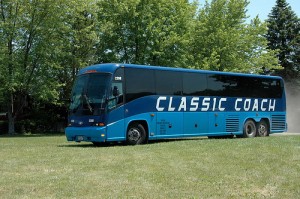 But the waiting doesn’t end with the pick-up of the bags. No siree. Then there’s the parking lot send-off where the parents stand in the middle of an open parking lot in midday. Blinking, shielding their eyes in the glaring heat (even behind the giant black Jackie-O glasses bought for the occasion) at a tinted window to try to catch a last glimpse of their child while trying to choke back emotion to “put on a good front”. Inevitably, there’s a late-comer who was stuck in traffic so us parents are left standing like beauty pageant idiots waving and waiting, waving and waiting.
But the waiting doesn’t end with the pick-up of the bags. No siree. Then there’s the parking lot send-off where the parents stand in the middle of an open parking lot in midday. Blinking, shielding their eyes in the glaring heat (even behind the giant black Jackie-O glasses bought for the occasion) at a tinted window to try to catch a last glimpse of their child while trying to choke back emotion to “put on a good front”. Inevitably, there’s a late-comer who was stuck in traffic so us parents are left standing like beauty pageant idiots waving and waiting, waving and waiting.
Once the bus pulls away then the wait for the first online picture begins. Can you say refresh button? You never know when new pics will be posted… And of course, the first letter (hopefully with no circled tear droplets or talk of homesickness and hitching a ride home) and the first phone call. Visiting Day can never arrive quickly enough and as soon as you pull away from camp, the countdown to their homecoming begins. And then there’s the the daily wait for the mailman in the hopes he brings some small tidbit of a literary connection.
Key thing to note (and I learned this the hard way the first summer my kids were away), is that my summer life is what happens in 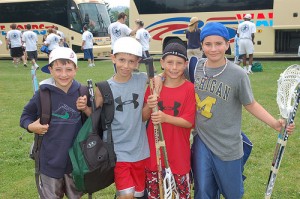 between all this waiting. So although I miss them terribly each summer and usually have several countdowns going at once, I also recognize that the countdown to the hectic long days of the school year with homework, carpooling, sports practices and coordination of schedules is also going on during these precious and fleeting summer weeks.
between all this waiting. So although I miss them terribly each summer and usually have several countdowns going at once, I also recognize that the countdown to the hectic long days of the school year with homework, carpooling, sports practices and coordination of schedules is also going on during these precious and fleeting summer weeks.
So I’m trying to appreciate the waiting. And dare I say, enjoy it. Because before you know it, we’ll all have to endure the longest wait of all… when summer ends and we wait until next summer to do it all over again.
Lisa
Tags: American summer camps, camp parent, getting ready for summer camp, kids summer camp, packing for summer camp, prepare for summer camp, preparing for summer camp, ready for summer camp, summer camp 2011
Posted in Uncategorized | 3 Comments »
Thursday, March 24th, 2011
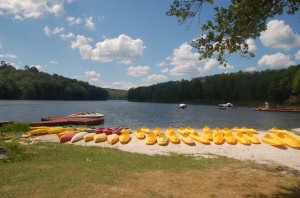 Almost every camper will name his or her waterfront area as one of the best parts of camp. Many camps are built on lakes and their waterfronts play a crucial role during the summer, not only as a place for swimming but as a gathering place and the perfect backdrop for outdoor evening activities. Learning to swim at summer camp is a rite of passage. But learning to swim not only provides a great foundation for building camp memories of sunny days spent at the waterfront, it has lifelong benefits as well.
Almost every camper will name his or her waterfront area as one of the best parts of camp. Many camps are built on lakes and their waterfronts play a crucial role during the summer, not only as a place for swimming but as a gathering place and the perfect backdrop for outdoor evening activities. Learning to swim at summer camp is a rite of passage. But learning to swim not only provides a great foundation for building camp memories of sunny days spent at the waterfront, it has lifelong benefits as well.
Of course, there are the much acclaimed physical and mental benefits that we all know. It’s a great low impact exercise that is suitable for almost everyone, which makes it an ideal part of a regular fitness regime. It’s also not age restrictive. Rather, it’s an activity that can be enjoyed for a lifetime. The fact that muscle strength is also greatly improved as a result of pushing oneself through the water goes without saying.
Swimming also improves coordination, emotional well being, concentration, and social skills. In fact, it’s the largely social aspect of 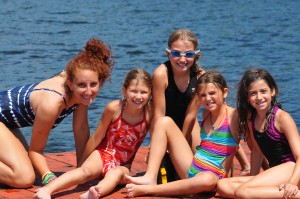 camping that likely makes it such a positive and popular part of the camping experience. The relaxing atmosphere of a pool or waterfront area provides the perfect setting for children to let down their guards and enjoy the type of casual conversation that builds and strengthens friendships. When combined with the sheer fun of the activity, it’s the perfect setting for building memories.
camping that likely makes it such a positive and popular part of the camping experience. The relaxing atmosphere of a pool or waterfront area provides the perfect setting for children to let down their guards and enjoy the type of casual conversation that builds and strengthens friendships. When combined with the sheer fun of the activity, it’s the perfect setting for building memories.
Camp waterfront locations are extremely active and full of almost endless possibilities for campers to experience. There are often several activities taking place at once, which is why camp Waterfront areas are typically generously staffed with well trained, fully certified lifeguards who complete an extensive and rigorous training program prior to the start of camp.
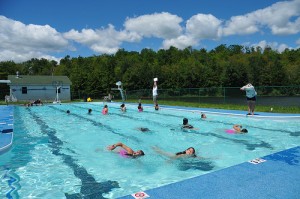 The pool area is not merely a place for swim instruction at summer camp but fun activities such as synchronized swimming competitions in which campers have fun using creativity and teamwork to choreograph a musical number that combines dancing and swimming. Pool parties are popular evening activities at camp, complete with music and plenty of opportunity to socialize.
The pool area is not merely a place for swim instruction at summer camp but fun activities such as synchronized swimming competitions in which campers have fun using creativity and teamwork to choreograph a musical number that combines dancing and swimming. Pool parties are popular evening activities at camp, complete with music and plenty of opportunity to socialize.
Even more adventure can be found on larger lake areas that, in addition to swimming beaches, also often have water toys, such as trampolines, rock-its, and climbing rocks for campers to enjoy. Since these areas require campers to pass a swim test prior to being able to use them, they provide fun and attainable goals for campers: first, to pass the test that allows them to swim to these special areas, then the challenge of climbing the wall or walking the plank. Camps also incorporate their waterfront areas into special event planning. Water games and pirate themed treasure hunts are just a couple of ways that water play is used creatively in camp programs.
Swimming at camp takes on a new level of excitement when included in camp activities–such as decathlons, apache relays, and 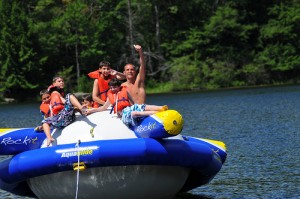 Olympics or Color Wars–that give campers the opportunity to use their swimming skills to rise to a challenge. Many camps also compete in swim meets through their inter camp leagues. Whether racing against other campers or a time clock, being able to apply their swimming instruction in an engaging way and to see firsthand how they’ve improved has been a moment of pride for many a camper.
Olympics or Color Wars–that give campers the opportunity to use their swimming skills to rise to a challenge. Many camps also compete in swim meets through their inter camp leagues. Whether racing against other campers or a time clock, being able to apply their swimming instruction in an engaging way and to see firsthand how they’ve improved has been a moment of pride for many a camper.
So the next time your child regales you with tales of the waterfront at his or her summer camp, remember that it’s not just summer memories that they’re gaining from their swimming experiences, but lifelong skills.
Tags: American summer camps, benefits of camp, camp activities, Camp Starlight, camp waterfront, camp waterfront activities, child fitness, kids summer camp, learning to swim at camp, life at summer camp, summer camp 2011, summer camp swim instruction, swim instruction, swim instruction at summer camp, swimming at camp
Posted in Uncategorized | No Comments »
Tuesday, March 22nd, 2011
Starlighters, in 2011 we will be embarking on a very important milestone in history. This summer will be the 10th anniversary of  the Starlight Wrestling Federation, an event unrivaled and looked forward to every year! We know the 10th annual SWF match will entertain with laughs and new champions from a fresh line-up of contenders, but looking back, what have been the best moments? Was it the shock of seeing our favorite bus driver, Kathy, step into the ring and body slam Tracy? We all remember the days of Team Canada being led in by Megan and backed up by the daunting strength of Hugh, a veritable legend in SWF history. Perhaps your favorite moment was when the Tambourine Trashers of Lower Camp put out the flames of the Upper Camp Fire Department. For me, it was when the entire Starlight branch of the Boczkowski family strutted their way to the ring to lead Kyle to victory! Whatever the moment, the Starlight Wrestling Federation match has wrangled its way into our hearts. We can all look
the Starlight Wrestling Federation, an event unrivaled and looked forward to every year! We know the 10th annual SWF match will entertain with laughs and new champions from a fresh line-up of contenders, but looking back, what have been the best moments? Was it the shock of seeing our favorite bus driver, Kathy, step into the ring and body slam Tracy? We all remember the days of Team Canada being led in by Megan and backed up by the daunting strength of Hugh, a veritable legend in SWF history. Perhaps your favorite moment was when the Tambourine Trashers of Lower Camp put out the flames of the Upper Camp Fire Department. For me, it was when the entire Starlight branch of the Boczkowski family strutted their way to the ring to lead Kyle to victory! Whatever the moment, the Starlight Wrestling Federation match has wrangled its way into our hearts. We can all look 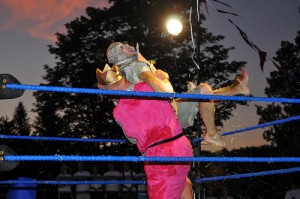 back and laugh and smile as we remember our counselors and key staff braving the pit of apple sauce, watermelon, creamed corn, Jello, or whatever else we had cooked up for the event. Who can guess what sort of shenanigans and characters we may see under the bright lights before us as we gather together this summer for the 10th time to cheer on the winner of the highly sought after gold belt?
back and laugh and smile as we remember our counselors and key staff braving the pit of apple sauce, watermelon, creamed corn, Jello, or whatever else we had cooked up for the event. Who can guess what sort of shenanigans and characters we may see under the bright lights before us as we gather together this summer for the 10th time to cheer on the winner of the highly sought after gold belt?
Tags: American summer camps, camp activities, camp events, camp for kids, Camp Starlight, camp traditions, life at summer camp, summer camp, summer camp 2011, summer camp history
Posted in Uncategorized | No Comments »
Thursday, March 17th, 2011
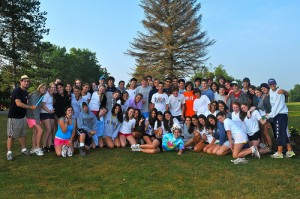 The other day as I was listening to the radio while driving down the road, in the blink of an eye, I was back in the Dining Room surrounded by the voices, noises, and even the smells of Camp Starlight. I love it when those moments happen. Something as simple as one song can transform your mood, surroundings, and energy. Not only do we come across unexpected moments that return us to our summer home away from home, but it creates an excitement, buzz, and energy that I know I can’t shake. When times like that happen, I’ll find myself on the phone or computer reconnected to a long lost camp friend.
The other day as I was listening to the radio while driving down the road, in the blink of an eye, I was back in the Dining Room surrounded by the voices, noises, and even the smells of Camp Starlight. I love it when those moments happen. Something as simple as one song can transform your mood, surroundings, and energy. Not only do we come across unexpected moments that return us to our summer home away from home, but it creates an excitement, buzz, and energy that I know I can’t shake. When times like that happen, I’ll find myself on the phone or computer reconnected to a long lost camp friend.
More importantly, those quick, unexpected instances make me want to return to camp as soon as I possibly can. I am reminded each time those moments happen why I fell in love with Camp Starlight, its campers, and staff twelve years ago. I feel I am one of the fortunate; I have had the opportunity to experience Camp Starlight, and I look forward to the next time I hear a song on the radio that sends me back to camp.
What brings you back?
Tags: American summer camps, camp activities, camp counselor, camp friends, Camp songs, Camp Starlight, camp traditions, kids summer camp, life at summer camp, old camp friends, Singing at camp, summer camp, summer camp 2011, summer camp friends
Posted in Uncategorized | No Comments »
Tuesday, March 15th, 2011
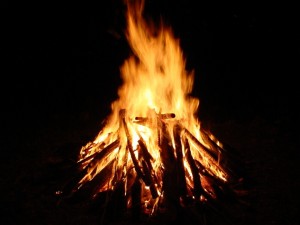 One of the most endearing and sacred parts of summer camp is the campfire. More than just wood lit with a match, it’s an intimate part of the camping experience that goes far beyond simply sitting around a fire. Each camp has a set of traditions uniquely connected to the campfire experience and, to campers, each tradition is significant, demanding reverence. The campfire is the very place where many children recall the moment when their camp transformed from “a camp” to “their camp”, where fellow campers and counselors become family while singing songs, roasting s’mores, and engaging in campfire activities. So intricate is the campfire to the summer camp experience that even former Disney CEO Michael Eisner has reflected on its importance in making him who he is:
One of the most endearing and sacred parts of summer camp is the campfire. More than just wood lit with a match, it’s an intimate part of the camping experience that goes far beyond simply sitting around a fire. Each camp has a set of traditions uniquely connected to the campfire experience and, to campers, each tradition is significant, demanding reverence. The campfire is the very place where many children recall the moment when their camp transformed from “a camp” to “their camp”, where fellow campers and counselors become family while singing songs, roasting s’mores, and engaging in campfire activities. So intricate is the campfire to the summer camp experience that even former Disney CEO Michael Eisner has reflected on its importance in making him who he is:
“Simply consider the lessons I was taught by the campfire…every time the rich reward was the same as we simply sat and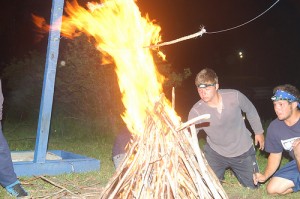 enjoyed our consuming creation. And, there was one aspect in particular that never failed to intrigue me, and that was the process of seeing the single small flame of the match spread to the kindling and then the twigs and then the smaller branches and finally the larger logs. It didn’t dawn on me until years later, but this was the perfect metaphor for the creative process…Years later, I found myself running a network television division and then a movie studio and now an entire entertainment company. But, much of the success I’ve achieved can be traced to the direct and metaphorical
enjoyed our consuming creation. And, there was one aspect in particular that never failed to intrigue me, and that was the process of seeing the single small flame of the match spread to the kindling and then the twigs and then the smaller branches and finally the larger logs. It didn’t dawn on me until years later, but this was the perfect metaphor for the creative process…Years later, I found myself running a network television division and then a movie studio and now an entire entertainment company. But, much of the success I’ve achieved can be traced to the direct and metaphorical
lessons I learned in building those campfires.”
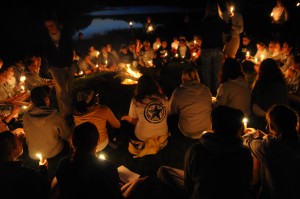 To some, to assign such significance to fire may seem a bit of a stretch. But to anyone who has attended camp, it’s not only believable but apt. Beyond Eisner’s metaphor, the campfire is symbolic of camp, and represents the bonding between campers and nature. Campfires instantly evoke feelings of togetherness and promote an atmosphere of being together in an intimate setting that is unique to the people who are present. Many camps hold opening and closing campfires to welcome campers and immerse them in the camping experience and to help them say goodbye at the end of the summer. At the beginning of the summer, the flames represent the birth of a new summer. Opening campfires often include some sort of ritual that introduces an idea or process that can be re-visited throughout the summer, such as setting goals for the summer or some sort of introduction and bonding activity with camp “siblings”. The meaning of the flames, however, transforms at the end of the summer. The burning of a closing campfire represents the end of the season. It’s a way to give the summer a proper and respectful send off. Campfires held throughout the summer supplement overnight camping trips and special events.
To some, to assign such significance to fire may seem a bit of a stretch. But to anyone who has attended camp, it’s not only believable but apt. Beyond Eisner’s metaphor, the campfire is symbolic of camp, and represents the bonding between campers and nature. Campfires instantly evoke feelings of togetherness and promote an atmosphere of being together in an intimate setting that is unique to the people who are present. Many camps hold opening and closing campfires to welcome campers and immerse them in the camping experience and to help them say goodbye at the end of the summer. At the beginning of the summer, the flames represent the birth of a new summer. Opening campfires often include some sort of ritual that introduces an idea or process that can be re-visited throughout the summer, such as setting goals for the summer or some sort of introduction and bonding activity with camp “siblings”. The meaning of the flames, however, transforms at the end of the summer. The burning of a closing campfire represents the end of the season. It’s a way to give the summer a proper and respectful send off. Campfires held throughout the summer supplement overnight camping trips and special events.
To say that the campfire breeds creativity is not only accurate, but understated. The various representations and  meanings that the actual fire itself takes on helps campers learn to look at the same thing from different angles, a crucial aspect of honing creative thought and learning to think “outside the box”, which is essential to developing good problem solving skills. When considered from this perspective, it’s not at all difficult to imagine a CEO of one of the world’s largest companies crediting much of his success to his camp experiences, specifically to the campfire. In fact, it provides insight about the significance of camp and how the lessons learned there can be carried throughout life.
meanings that the actual fire itself takes on helps campers learn to look at the same thing from different angles, a crucial aspect of honing creative thought and learning to think “outside the box”, which is essential to developing good problem solving skills. When considered from this perspective, it’s not at all difficult to imagine a CEO of one of the world’s largest companies crediting much of his success to his camp experiences, specifically to the campfire. In fact, it provides insight about the significance of camp and how the lessons learned there can be carried throughout life.
Tags: American summer camps, building character, building character at camp, camp activities, Camp Starlight, camp traditions, campfire traditions, campfires, campfires at summer camp, kids summer camp, life at summer camp, summer camp, summer camp 2011, summer camp history, summer camp traditions, summer camps
Posted in Uncategorized | No Comments »
Thursday, March 10th, 2011
Over several decades, across many miles, and in the heart of campers of all ages lies the excitement of arguably the most 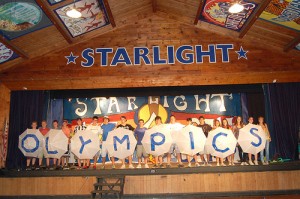 anticipated event of the summer. When will it happen? Who will be our leadership? What team will I be on? These questions echo in the minds of campers and counselors alike throughout the school year, and they only grow more intense as the summer progresses. So what is this hallowed event that has everyone’s attention? And what is it about this event that has everyone so excited?
anticipated event of the summer. When will it happen? Who will be our leadership? What team will I be on? These questions echo in the minds of campers and counselors alike throughout the school year, and they only grow more intense as the summer progresses. So what is this hallowed event that has everyone’s attention? And what is it about this event that has everyone so excited?
Well, at Camp Starlight we call this thrilling week of spirit and competition Olympics! Our campers and staff pass many a spare moment over the year thinking about what the team names will be, who will be the officers and captains, and what the theme for Sing will be. Once the summer kicks off, and the weeks begin to pass, whispers about when it will break can be heard around camp.
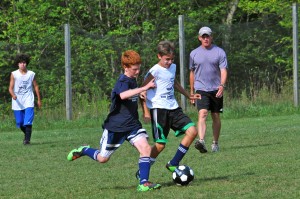 But as anyone who has spent a summer at Starlight will tell you, Olympics is an exhilarating week of athletic, strategic, and academic competition. Whether your strength is playing on the soccer field, catching cheese balls on your shaving cream laden head, or having the fastest buzzer pressing thumb in Wayne County, your team will be depending on your contribution! From the second Olympics breaks to the moment your feet hit the lake after the final scores are announced, the electrifying spirit of the Blue and the White can be felt in the air. At Starlight, there is no doubt that we truly do justice to the time honored tradition shared by summer camps around the country and passed down over many years.
But as anyone who has spent a summer at Starlight will tell you, Olympics is an exhilarating week of athletic, strategic, and academic competition. Whether your strength is playing on the soccer field, catching cheese balls on your shaving cream laden head, or having the fastest buzzer pressing thumb in Wayne County, your team will be depending on your contribution! From the second Olympics breaks to the moment your feet hit the lake after the final scores are announced, the electrifying spirit of the Blue and the White can be felt in the air. At Starlight, there is no doubt that we truly do justice to the time honored tradition shared by summer camps around the country and passed down over many years.
So the next time you catch yourself daydreaming of smearing on your face paint 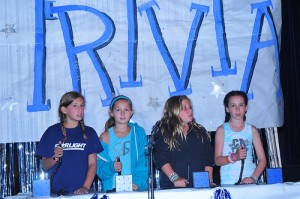 or spraying your hair in your team’s shade, know that there is another Starlighter somewhere sharing in your excitement and anticipation. So until we’re back together facing off on the fields, dodging gigs in our seats, and handing off the baton, make sure to keep “B-L-U-E, we got the spirit!” and “We are the white team! Couldn’t be prouder!” fresh in your thoughts!
or spraying your hair in your team’s shade, know that there is another Starlighter somewhere sharing in your excitement and anticipation. So until we’re back together facing off on the fields, dodging gigs in our seats, and handing off the baton, make sure to keep “B-L-U-E, we got the spirit!” and “We are the white team! Couldn’t be prouder!” fresh in your thoughts!
Tags: American summer camps, athletics, benefits of camp, building character, building character at camp, camp activities, camp events, camp for kids, Camp Starlight, camp traditions, kids summer camp, life at summer camp, Olympics, ready for summer camp, summer camp 2011, summer camps
Posted in Uncategorized | No Comments »
Tuesday, March 8th, 2011
 In the first part of this blog series, we discussed the benefits of physical activity at camp. There are underlying advantages to this that directly relate to nutritional habits. Research shows that that the more time children spend doing passive activities such as watching television, sitting at a computer, or playing video games, the more likely they are to overeat. The reason for this is simple. A sedentary lifestyle leads to boredom. Nutritionists assert that lack of activity mars a child’s ability to determine the difference between boredom and hunger. Unfortunately, according to dietician Jennifer Thomas, the increased amount of free time and lack of structure that often comes with summer break makes children particularly vulnerable to tedium and excessive food consumption. Says Thomas, “A child can pick up 5 to 10 pounds over the course of a summer, so it’s important to recognize the difference between boredom and hunger.”
In the first part of this blog series, we discussed the benefits of physical activity at camp. There are underlying advantages to this that directly relate to nutritional habits. Research shows that that the more time children spend doing passive activities such as watching television, sitting at a computer, or playing video games, the more likely they are to overeat. The reason for this is simple. A sedentary lifestyle leads to boredom. Nutritionists assert that lack of activity mars a child’s ability to determine the difference between boredom and hunger. Unfortunately, according to dietician Jennifer Thomas, the increased amount of free time and lack of structure that often comes with summer break makes children particularly vulnerable to tedium and excessive food consumption. Says Thomas, “A child can pick up 5 to 10 pounds over the course of a summer, so it’s important to recognize the difference between boredom and hunger.”
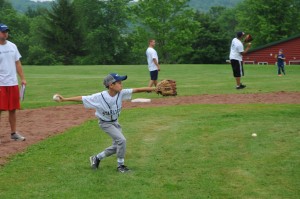
Concern about the obesity crisis has sprung to the forefront of the camping industry. Cedric Bryant, Ph.D. and Chief Scientist for The American Council on Excercise, was a keynote speaker at the 2011 American Camp Association’s (ACA) National Conference, attended by thousands of camp professionals. In his address, Dr. Bryant discussed the growing issue of obesity and praised the ability of summer camp to transform poor habits through exercise. Most traditional summer camps offer children a healthy mix of hobbies and athletics. Camp staff members encourage campers to participate in everything that’s offered to them, even that which they might not necessarily do or try at home.
There is also something to be said for the fact that many summer camp activities, including dining, are scheduled into a child’s day and carried out in a group setting. Access to food is limited throughout campus, and eating is typically not permitted in bunks. 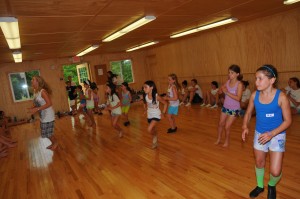 Quite simply, obtaining food at camp is not as easy as walking into the pantry or opening the refrigerator on a whim for lack of something better to do. New research has established many benefits to family meals. One potentially underrated advantage is that dining as a unit may keep consumption in check by limiting what nutritionists call the “eating area”, the combination of time and space in which eating occurs. “This strategy can help determine if they [children] are really hungry or just bored,” says Thomas. Meals at summer camp are held at specific times in a designated place—usually a dining or mess hall—and campers dine together, often with their bunkmates. Counselors supervise, insuring that everyone receives food and reporting any changes in a camper’s eating patterns.
Quite simply, obtaining food at camp is not as easy as walking into the pantry or opening the refrigerator on a whim for lack of something better to do. New research has established many benefits to family meals. One potentially underrated advantage is that dining as a unit may keep consumption in check by limiting what nutritionists call the “eating area”, the combination of time and space in which eating occurs. “This strategy can help determine if they [children] are really hungry or just bored,” says Thomas. Meals at summer camp are held at specific times in a designated place—usually a dining or mess hall—and campers dine together, often with their bunkmates. Counselors supervise, insuring that everyone receives food and reporting any changes in a camper’s eating patterns.
The four day 2011 ACA conference also featured seminars that addressed issues such as how to work together to improve the  overall health and nutrition of campers, understanding the relationship between nutrition and wellness and using that knowledge to help campers be high achievers through healthy bodies and minds, and adding healthy options to dining room menus, particularly for those campers who require special diets.
overall health and nutrition of campers, understanding the relationship between nutrition and wellness and using that knowledge to help campers be high achievers through healthy bodies and minds, and adding healthy options to dining room menus, particularly for those campers who require special diets.
Indeed, though many camps are constantly striving to improve in these areas, the notions introduced in these seminars are not new. Meals served by most summer camps are carefully planned and balanced in accordance with USDA recommendations. Many camps also encourage their campers to make healthy choices at mealtimes by providing several fruit options in the morning and salad bars at lunch and dinner. Vegetarian alternatives are typically available and, increasingly, more attention is being given to rising nutritional challenges such as diabetic or gluten free diets.
All of this is enough to make summer camp worth considering as a combatant to the type of lackadaisical lifestyle that leads to poor eating habits and, possibly, obesity.
Tags: American summer camps, athletics, battling childhood obesity, benefits of camp, camp activities, child development, Child health and nutrition, childhood fitness at summer camp, exercise at summer camp, health and nutrition at summer camp, life at summer camp, Nutrition at summer camp, summer camp, summer camp 2011, summer camps
Posted in Uncategorized | 1 Comment »
Thursday, March 3rd, 2011
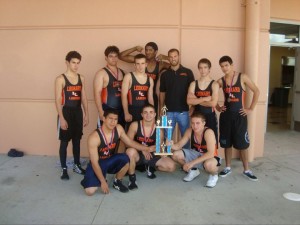 Camp Starlight Boy’s Athletic Director, Adam Schumer, recently checked in to let us know what he has been up to and gave us a couple of exercises to help us train for the 2011 Slope for Lope.
Camp Starlight Boy’s Athletic Director, Adam Schumer, recently checked in to let us know what he has been up to and gave us a couple of exercises to help us train for the 2011 Slope for Lope.
After Camp; Adam returned to his job as an elementary physical education teacher at Forest Hill Elementary School in Palm Beach County, Florida. Adam is extremely busy as the coach of the John I. Leonard High School Wrestling team. His team recently won the Palm Beach Gardens duals, and they have seen remarkable improvement across all weight classes. Adam and his team look forward to the regional, district, and state tournaments.
To keep active during the off-camp season, Adam participates in a number of athletic events. He ran in the Palm Beaches Marathon Festival, where he finished near the top of his age group this past December. Adam also participates in various Adventure Races across Florida. These races include canoeing, biking, and running. Participants are given a map and are required to check in at various points as they make their way through the course. Adam plans to bring this Adventure Race concept to Starlight this summer.
Adam says the winter season is the perfect time to move your exercise routine indoors, and he suggested a couple of fun winter activities for campers. Younger campers should start practicing some of your favorite circus tricks, such as hula hooping, juggling, or jumping rope (if you have high ceilings). Just make sure you’ve got enough space and don’t damage any of your parents’ favorite furniture! Older campers, keep up the yoga and pilates. They are great for strengthening muscles, improving flexibility,and lowering stress from homework and exams. They’re also easy and inexpensive activities that you can do just about anywhere in your house.
Hopefully these drills help out, and he can’t wait to see you at Camp in June!
Tags: ahtletic director, American summer camps, athletics, benefits of camp, camp activities, Camp Starlight, child fitness, childhood fitness, exercise for children, fitness at summer camp, kids summer camp, life at summer camp, prepare for summer camp, ready for summer camp, summer camp, summer camp 2011, summer camp athletic director, summer camps
Posted in Uncategorized | 2 Comments »
Tuesday, March 1st, 2011
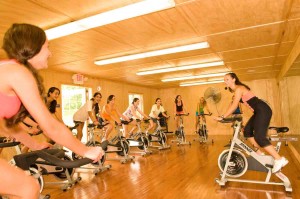 With the Center for Disease Control and Prevention (CDC) reporting that nearly 1 in 5 children between the ages of 6 and 19 is obese, it has become imperative that we, as parents, make as much effort to set our children up for success in establishing proper food habits, just as we would in other areas of their lives. Three primary causes consistently cited for childhood obesity are lack of physical activity, an unbalanced diet and overeating. An often overlooked benefit to summer camp is the significant impact it has in curbing childhood obesity by promoting an active lifestyle and healthy eating practices. In this multi-part series, we will examine the efforts being made by summer camps to battle poor diet and exercise.
With the Center for Disease Control and Prevention (CDC) reporting that nearly 1 in 5 children between the ages of 6 and 19 is obese, it has become imperative that we, as parents, make as much effort to set our children up for success in establishing proper food habits, just as we would in other areas of their lives. Three primary causes consistently cited for childhood obesity are lack of physical activity, an unbalanced diet and overeating. An often overlooked benefit to summer camp is the significant impact it has in curbing childhood obesity by promoting an active lifestyle and healthy eating practices. In this multi-part series, we will examine the efforts being made by summer camps to battle poor diet and exercise.
Part I. Physical Activity
Beyond traditional summer camp sports such as soccer, basketball, baseball, roller hockey and gymnastics, many camps are 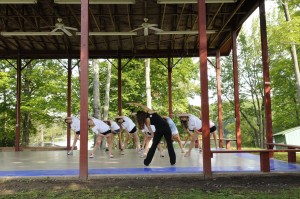 increasingly focusing on the development of extensive programs for such popular fitness activities as spin, running, weights, zumba, yoga and the martial arts. The instant popularity of these programs suggests that children have a natural interest in exercise and will engage in it of their own accord in the absence of many of the daily distractions that promote a more lethargic lifestyle but are not readily available at summer camp, such as computers, video game systems and television. The ability to participate in fitness programs as a form of fun also encourages campers to approach such activities with an open mind rather than as something forced on them and that is only done out of necessity.
increasingly focusing on the development of extensive programs for such popular fitness activities as spin, running, weights, zumba, yoga and the martial arts. The instant popularity of these programs suggests that children have a natural interest in exercise and will engage in it of their own accord in the absence of many of the daily distractions that promote a more lethargic lifestyle but are not readily available at summer camp, such as computers, video game systems and television. The ability to participate in fitness programs as a form of fun also encourages campers to approach such activities with an open mind rather than as something forced on them and that is only done out of necessity.
Some camps are also experimenting with nutrition programs that marry cooking activities with fitness. Such programs teach campers how to plan healthy meals and snacks and then prepare them. Cooking programs are among the most popular at summer camp. To merge them with nutrition is a clever way to demonstrate the importance of using discretion in choosing what we eat and consuming it in moderation. In the past, the idea of “diet,” as in depriving oneself of necessary nutrients, has been cited as a contributing factor in the growth of eating disorders and yo-yo dieting.
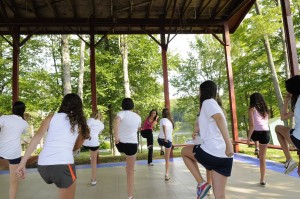 For those who question the lasting effects of fitness and nutritional habits adapted at summer camp, statistics indicate that they won’t be going away anytime soon. According to the American Camp Association, more than half of children who pursue a new interest at camp will continue pursuing that interest once they return home.
For those who question the lasting effects of fitness and nutritional habits adapted at summer camp, statistics indicate that they won’t be going away anytime soon. According to the American Camp Association, more than half of children who pursue a new interest at camp will continue pursuing that interest once they return home.
Up next, part II. An Unbalanced Diet
Tags: benefits of camp, camp activities, camp for kids, Camp Starlight, child development, child fitness, Children and fitness, developing healthy eating habits, exercise and children, fitness programs at summer camp, life at summer camp, summer camp 2011, summer camp fitness programs
Posted in Uncategorized | No Comments »
Friday, February 25th, 2011
Few people think of finding a summer job while bundled in scarves, coats, and gloves as they attempt to maneuver roadways and 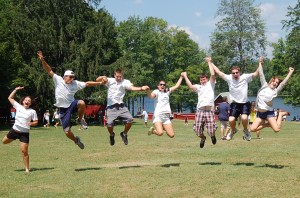 college campuses after the latest snowfall. However, whether 2011 is the first time you’re considering a summer camp position or you’re a seasoned veteran, February is exactly the time to start the process of securing summer employment, if you haven’t already done so. Many camps attend campus recruiting fairs in order to assemble the perfect staff. So why should you attend one of these fairs or complete an online application now? To begin with, a camp job is definitely fun, but also a lot of work…so be prepared! Where else can you get paid to play all day while building valuable job skills? Whether you work in a specific area and focus on a sport, activity or hobby you love or you work as a counselor who travels from activity to activity with campers, your day is full of exciting challenges and a probably even a few surprises, both of which will develop your problem-solving, critical thinking, and negotiation skills.
college campuses after the latest snowfall. However, whether 2011 is the first time you’re considering a summer camp position or you’re a seasoned veteran, February is exactly the time to start the process of securing summer employment, if you haven’t already done so. Many camps attend campus recruiting fairs in order to assemble the perfect staff. So why should you attend one of these fairs or complete an online application now? To begin with, a camp job is definitely fun, but also a lot of work…so be prepared! Where else can you get paid to play all day while building valuable job skills? Whether you work in a specific area and focus on a sport, activity or hobby you love or you work as a counselor who travels from activity to activity with campers, your day is full of exciting challenges and a probably even a few surprises, both of which will develop your problem-solving, critical thinking, and negotiation skills.
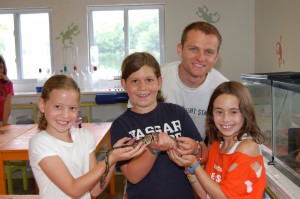 If you like working with children and aspire to a career in a field such as education, sports training, psychology or sociology, then you already have another reason to work at a camp. Camp is an excellent place to gain valuable experience and is impressive on a resume. Although camp seems lighthearted–and it is in many ways–working at camp requires a lot of responsibility, flexibility, and adaptability, all of which are very valuable characteristics sought by employers. Each day guarantees new challenges, many of them unexpected. Summer camp is often organized chaos. Yes, there is always a plan in place, but the unexpected is also inevitable. While this may seem scary the first couple days, it also brings an excitement and satisfaction that delivering pizzas or serving food (or even working at an investment bank) never could. Working at camp also requires a lot of communication and interpersonal interaction, two more transferrable skills that are highly valued by employers. At camp, you must effectively co-exist with your campers, co-counselors, and other staff members to be successful. You will also be able to tell future employers that you worked with people from all over the world and from many different socio-economic backgrounds. That you’ve overcome cultural, language, and social obstacles with others tells recruiters that diversity is not something you fear, but rather embrace.
If you like working with children and aspire to a career in a field such as education, sports training, psychology or sociology, then you already have another reason to work at a camp. Camp is an excellent place to gain valuable experience and is impressive on a resume. Although camp seems lighthearted–and it is in many ways–working at camp requires a lot of responsibility, flexibility, and adaptability, all of which are very valuable characteristics sought by employers. Each day guarantees new challenges, many of them unexpected. Summer camp is often organized chaos. Yes, there is always a plan in place, but the unexpected is also inevitable. While this may seem scary the first couple days, it also brings an excitement and satisfaction that delivering pizzas or serving food (or even working at an investment bank) never could. Working at camp also requires a lot of communication and interpersonal interaction, two more transferrable skills that are highly valued by employers. At camp, you must effectively co-exist with your campers, co-counselors, and other staff members to be successful. You will also be able to tell future employers that you worked with people from all over the world and from many different socio-economic backgrounds. That you’ve overcome cultural, language, and social obstacles with others tells recruiters that diversity is not something you fear, but rather embrace.
Working at summer camp can also be very healthy for your bank account. You won’t become Donald Trump spending your summers at camp. However; camps provide housing and food in addition to a salary. It’s possible to live virtually expense-free for a couple of months. Many summer camp counselors take home all or most of their salaries at the end of the summer.
Finally, you will form lifelong friendships at camp. You may arrive alone and nervous in June, but you will leave in August with 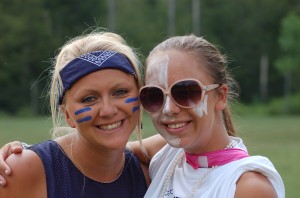 literally hundreds of friends from all over the world. Two months may not seem like a long time, but when one lives and works in close proximity with co-workers, it’s more than sufficient to form bonds that ordinarily would take years. There are always tears on the last day of camp, not only when saying goodbye to your campers, who will have secured a special place in your heart forever, but to co-workers—the ones you know you will see again as well as the ones you know you will not. Regardless, the world will seem like a much smaller place to you.
literally hundreds of friends from all over the world. Two months may not seem like a long time, but when one lives and works in close proximity with co-workers, it’s more than sufficient to form bonds that ordinarily would take years. There are always tears on the last day of camp, not only when saying goodbye to your campers, who will have secured a special place in your heart forever, but to co-workers—the ones you know you will see again as well as the ones you know you will not. Regardless, the world will seem like a much smaller place to you.
Though it may seem early to begin planning such a special adventure with so many possibilities, building a successful camp staff not only requires individuals who possess all of the qualities previously mentioned, it requires finding the right mix of personalities and talents. Such an endeavor, of course, takes time. Camp recruiters review literally thousands of applications each year and speak with hundreds of candidates to find those who are the best fit for their camp’s atmosphere, philosophy and program. Starting your job search while the ground is still white and the tree branches still bare provides you with the advantage of a larger pool of positions from which to choose. By April, most camps have nearly completed their hiring and only difficult to fill or highly specialized roles remain.
So, after a winter of wading through piles of snow, are you ready for a summer full of adventure?
Tags: American summer camps, benefits of camp, build your resume, building character, camp counselor, camp job, camp news, Camp Starlight, jobs at summer camp, life at summer camp, staff, summer camp 2011, summer camp job, summer camps, summer job
Posted in Uncategorized | No Comments »
 maturing experience – for me and them! My kids learn that the world still turns if they wear clothes that don’t match or the same shirt 4 days in a row, or what it’s like to meet new people, watch themselves become independent beings and experience things they never could at home (we don’t have a lake in our backyard or a kiln in the kitchen).
maturing experience – for me and them! My kids learn that the world still turns if they wear clothes that don’t match or the same shirt 4 days in a row, or what it’s like to meet new people, watch themselves become independent beings and experience things they never could at home (we don’t have a lake in our backyard or a kiln in the kitchen). inside of the trunks that are taken to camp. Ok, first off, let’s not date ourselves to when they were actual black with gold rivet trunks – they’re really just duffle bags. Granted, huge, enormous, can hold at least 4 grown men duffles, but duffle bags nevertheless. And these duffles sit in my bedroom for weeks until they are actually picked up and taken away (given that we don’t have an extra bedroom and my husband and I’s room has the most space). So I wait as long as possible to unearth them from where they are stashed all winter to reduce the number of nights I can possibly slip, roll and kill myself on an errant battery or sunscreen stick that has escaped the double layered ziploc bag in which it was stored. Aside from my general safety, I have to wait to pack because nothing pisses me off more than putting items inside the bags and crossing them off my checklist, only to be asked the next morning by one of my chidlren if they can wear that shirt, jersey, soccer cleat, you name it, one last time. So, although I have a few friends that are happy to feel organized starting this process in February for a June pick-up, I’ll stick with the wait-until-the-last-minute crunch time way that seems to work best for us.
inside of the trunks that are taken to camp. Ok, first off, let’s not date ourselves to when they were actual black with gold rivet trunks – they’re really just duffle bags. Granted, huge, enormous, can hold at least 4 grown men duffles, but duffle bags nevertheless. And these duffles sit in my bedroom for weeks until they are actually picked up and taken away (given that we don’t have an extra bedroom and my husband and I’s room has the most space). So I wait as long as possible to unearth them from where they are stashed all winter to reduce the number of nights I can possibly slip, roll and kill myself on an errant battery or sunscreen stick that has escaped the double layered ziploc bag in which it was stored. Aside from my general safety, I have to wait to pack because nothing pisses me off more than putting items inside the bags and crossing them off my checklist, only to be asked the next morning by one of my chidlren if they can wear that shirt, jersey, soccer cleat, you name it, one last time. So, although I have a few friends that are happy to feel organized starting this process in February for a June pick-up, I’ll stick with the wait-until-the-last-minute crunch time way that seems to work best for us. But the waiting doesn’t end with the pick-up of the bags. No siree. Then there’s the parking lot send-off where the parents stand in the middle of an open parking lot in midday. Blinking, shielding their eyes in the glaring heat (even behind the giant black Jackie-O glasses bought for the occasion) at a tinted window to try to catch a last glimpse of their child while trying to choke back emotion to “put on a good front”. Inevitably, there’s a late-comer who was stuck in traffic so us parents are left standing like beauty pageant idiots waving and waiting, waving and waiting.
But the waiting doesn’t end with the pick-up of the bags. No siree. Then there’s the parking lot send-off where the parents stand in the middle of an open parking lot in midday. Blinking, shielding their eyes in the glaring heat (even behind the giant black Jackie-O glasses bought for the occasion) at a tinted window to try to catch a last glimpse of their child while trying to choke back emotion to “put on a good front”. Inevitably, there’s a late-comer who was stuck in traffic so us parents are left standing like beauty pageant idiots waving and waiting, waving and waiting. between all this waiting. So although I miss them terribly each summer and usually have several countdowns going at once, I also recognize that the countdown to the hectic long days of the school year with homework, carpooling, sports practices and coordination of schedules is also going on during these precious and fleeting summer weeks.
between all this waiting. So although I miss them terribly each summer and usually have several countdowns going at once, I also recognize that the countdown to the hectic long days of the school year with homework, carpooling, sports practices and coordination of schedules is also going on during these precious and fleeting summer weeks.


